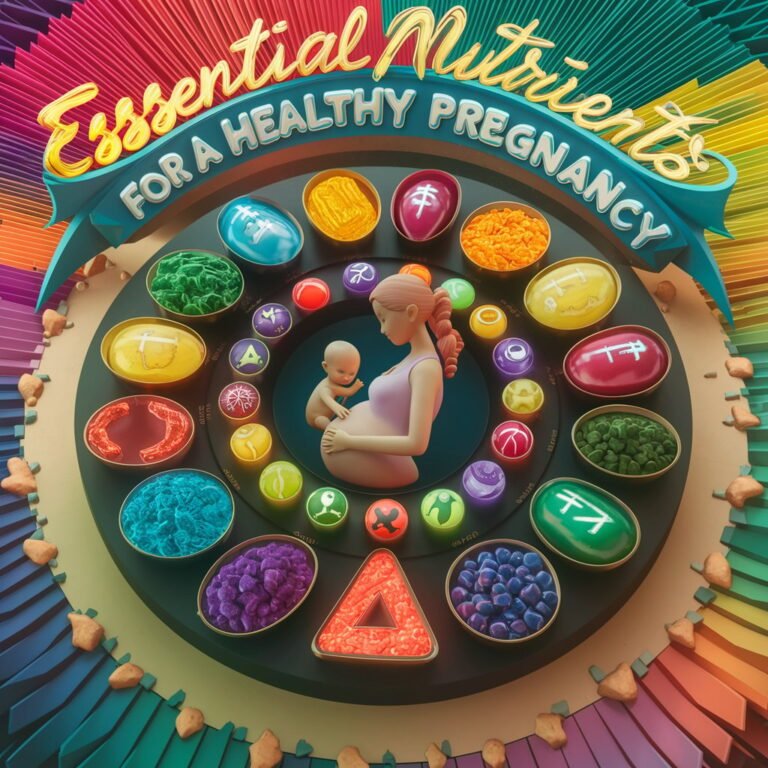Pregnancy is a critical time for both mother and baby, and proper nutrition plays a vital role in ensuring a healthy pregnancy outcome. This comprehensive guide will explore the essential nutrients required during pregnancy, their importance and how to incorporate them into your diet.
Why proper nutrition is important during pregnancy
During pregnancy, your body’s nutritional needs increase to support your growing baby and the changes in your body. Adequate nutrition can help:
- Support the healthy development of the fetus
- Reduce the risk of birth defects
- Reduce the chances of complications such as gestational diabetes and pre-eclampsia
- Promote healthy weight gain during pregnancy
- Prepare your body for labor and delivery
- Support postpartum recovery
Essential nutrients for a healthy pregnancy
1. Folic Acid (Vitamin B9)
Why it’s important: Folic acid is vital for preventing neural tube defects, which affect the baby’s brain and spine. It also supports the rapid growth of placental and fetal cells.
Recommended daily intake: 600-800 micrograms (mcg)
Food sources: Green leafy vegetables, fortified cereals, legumes, citrus fruits
End: Start taking folic acid supplements before conception and continue throughout pregnancy.
2. Iron
Why it’s important: Iron is essential for the production of hemoglobin, which carries oxygen to your tissues and to your baby. It helps prevent anemia and supports the growth and development of the baby’s brain.
Recommended daily intake: 27 milligrams (mg)
Food sources: Lean red meat, poultry, fish, beans, spinach, fortified cereals
End: Eat iron-rich foods with vitamin C to enhance absorption.
3. Calcium
Why it’s important: Calcium is vital for building your baby’s bones and teeth. It also helps maintain bone density during pregnancy.
Recommended daily intake: 1000 mg
Food sources: Dairy products, fortified plant-based milk, leafy greens, sardines
End: If you are lactose intolerant, consider calcium-fortified foods or supplements.
4. Omega-3 fatty acids (DHA and EPA)
Why it’s important: Omega-3s are vital for your baby’s brain and eye development. They can also help prevent preterm labor and maternal depression.
Recommended daily intake: At least 200 mg of DHA
Food sources: Fatty fish (salmon, sardines), algae-based supplements for vegetarians
End: If you don’t eat fish regularly, consider a pure fish oil or algae-based supplement.
5. Vitamin D
Why it’s important: Vitamin D helps your body absorb calcium and supports your baby’s bone development. It can also reduce the risk of pregnancy complications.
Recommended daily intake: 600-800 International Units (IU)
Food sources: Fatty fish, egg yolks, fortified milk. Exposure to sunlight also helps your body produce vitamin D.
End: Many women need supplements to meet their vitamin D needs, especially if they have limited sun exposure.
6. Protein
Why it’s important: Protein is essential for your baby’s growth, especially in the second and third trimesters. It also helps in the development of breast and uterine tissue during pregnancy.
Recommended daily intake: 71 grams
Food sources: Lean meats, poultry, fish, eggs, legumes, tofu, dairy products
End: Spread your protein intake throughout the day for optimal absorption.
7. Iodine
Why it’s important: Iodine is vital for your baby’s brain development and thyroid function. Deficiency can lead to mental disabilities.
Recommended daily intake: 220 mcg
Food sources: Iodized salt, seafood, dairy products, eggs
End: Check that your prenatal vitamin contains iodine, as not everyone does.
Putting it all together: A balanced pregnancy diet
While focusing on individual nutrients is important, it’s just as important to maintain a balanced diet throughout your pregnancy. Here’s a sample meal plan that incorporates many of these essential nutrients:
| Meal | Diet suggestions | Essential nutrients |
|---|---|---|
| Breakfast | Whole grain cereal with milk, berries and a handful of nuts | Folic acid, iron, calcium, protein |
| Snack | Greek yogurt with honey and sliced almonds | Calcium, protein |
| Lunch | Spinach salad with grilled chicken, avocado and olive oil dressing | Iron, folic acid, protein, healthy fats |
| Snack | Carrot sticks with hummus | Vitamins A and C, proteins |
| Dinner | Baked salmon with quinoa and steamed broccoli | Omega-3, protein, iron, folic acid |
Important tips for nutrition during pregnancy:
- Stay hydrated by drinking plenty of water throughout the day.
- Take a high-quality prenatal vitamin to fill in any nutritional gaps.
- Avoid raw or undercooked meats, unpasteurized dairy and fish with high mercury content.
- Limit caffeine intake to 200 mg per day or less.
- Consult your healthcare provider before taking any additional supplements.
When to seek professional advice
While this guide provides general information, every pregnancy is unique. It is important to consult your health care provider or a registered dietitian if:
- You have any pre-existing health conditions
- They are vegetarian or vegan
- You have food allergies or intolerances
- They carry multiples
- You have a history of eating disorders
- They are underweight or overweight
Conclusion
Proper nutrition during pregnancy is a key factor in ensuring the health of both you and your baby. By focusing on these essential nutrients and maintaining a balanced diet, you are giving your baby the best possible start in life. Remember, every small step towards better nutrition counts. Don’t stress if you can’t achieve perfection every day – consistency over time is what counts most.
At BabyBlue, we are committed to supporting you at every stage of your pregnancy journey. For more detailed information on pregnancy nutrition, meal planning ideas, or to connect with a nutritionist, explore our resources below.
